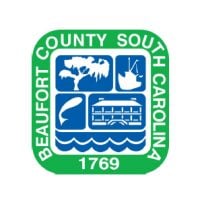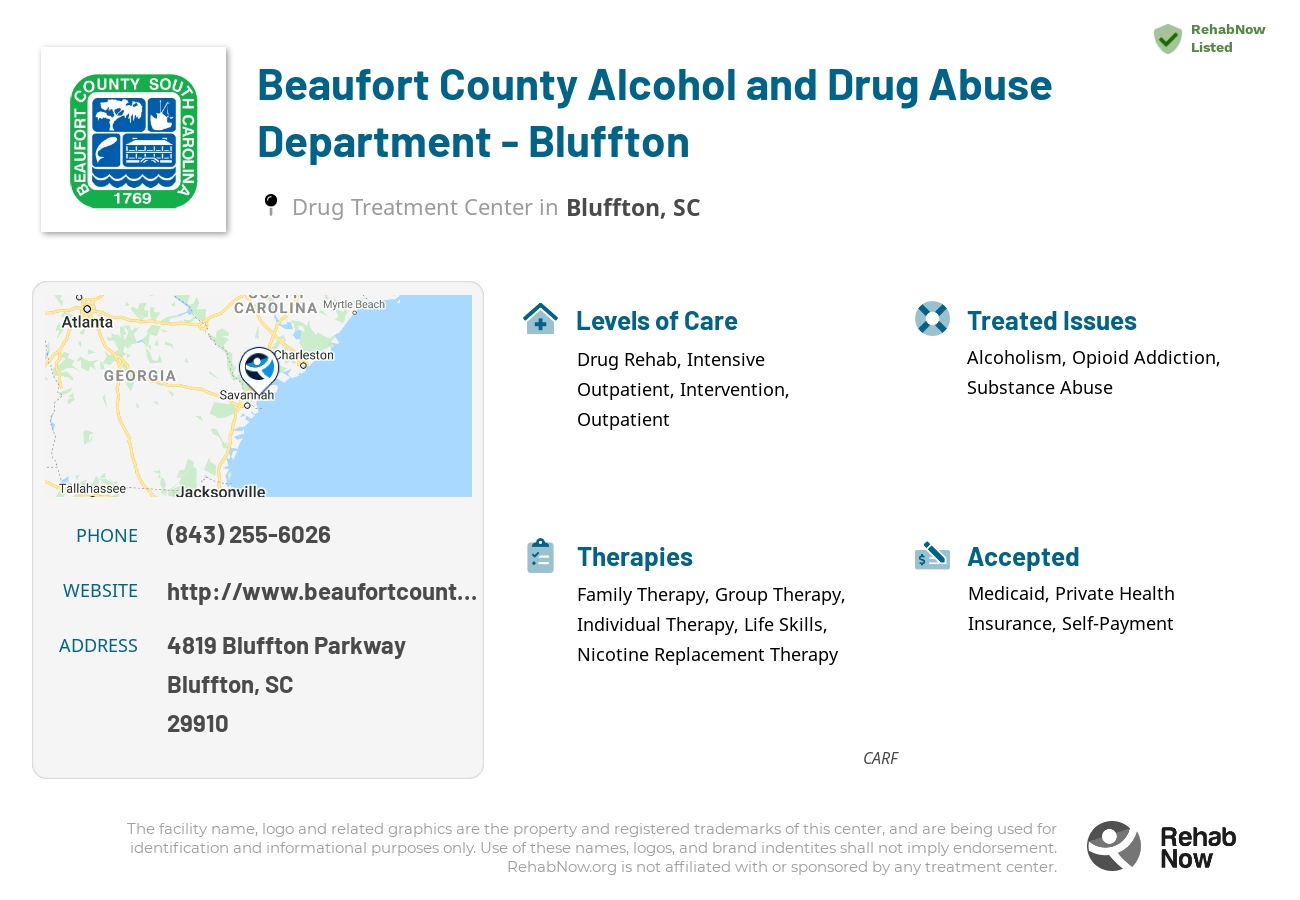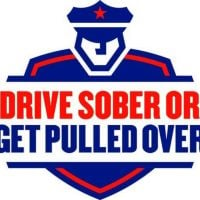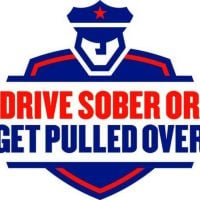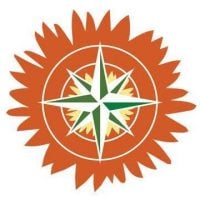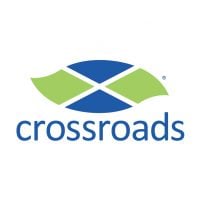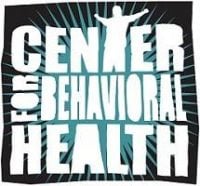Beaufort County Alcohol and Drug Abuse Department - Bluffton
Drug Rehab Center in Bluffton, South Carolina
Beaufort County Alcohol and Drug Abuse Department - Bluffton is a South Carolina clinic offering comprehensive substance abuse and addiction treatment programs, including individual and group therapy, detoxification, and medication management, with a team of experienced medical and mental health professionals.
About This South Carolina Facility
Beaufort County Alcohol and Drug Abuse Department - Bluffton is a clinic in South Carolina devoted to helping clients manage substance abuse and addiction issues. This clinic employs a team of experienced medical and mental health professionals to provide the highest quality of care to their patients in a safe and respectful environment. They offer a variety of treatment programs, including individual, group, and family therapy, detoxification, and partial hospitalization. For those looking for alternatives to traditional rehab, they also offer programs such as intensive outpatient treatment, medication management, and relapse prevention.
Beaufort County Alcohol and Drug Abuse Department - Bluffton offers comprehensive services for clients suffering from addiction issues. Their approach is to create customized plans that foster recovery and long-term sobriety based on evidence-based practices and individualized care. They strive to ensure that each client receives the best care possible and is provided the opportunity to reach their recovery goals. Among their strategies, they employ cognitive-behavioral therapy and motivational interviewing to help clients become more open to change, develop healthy coping strategies, and recognize triggers to their addiction.
Beaufort County Alcohol and Drug Abuse Department - Bluffton is licensed by the South Carolina Department of Alcohol and Other Drug Abuse Services and has been accredited by The Joint Commission, a nationally-recognized organization that sets standards for healthcare quality and safety. The clinic is also affiliated with the National Association of Addiction Treatment Providers, which is an organization that advocates for and provides resources to those seeking quality substance abuse treatment. Their dedicated team also offers educational and support group services, along with referrals for mental health services and local resources.
Genders
Ages
Modality
Additional
Accreditations

CARF
The Commission on Accreditation of Rehabilitation Facilities (CARF) is a non-profit organization that specifically accredits rehab organizations. Founded in 1966, CARF's, mission is to help service providers like rehab facilities maintain high standards of care.
Conditions and Issues Treated
A drug abuser needs help because if no one helps them, they will not leave their vicious circle.
People who abuse drugs are likely to suffer from an addiction, which can cause serious health problems. It can also cause quarrels with people around them. It is common for drug abusers to have difficulty holding down jobs or relationships, but sometimes people around them can be quite tolerant. There are cases where the families of the drug abusers do not want to see them get any help, and the subject becomes controversial.
When it comes to helping drug abusers get sober, there are many options to choose from. It is essential to state that there is no “correct” way of doing things. People are different, and they need different types of help to get over their addiction.
Opioid addiction treatment should be done in a medically supervised drug rehab. Opioid addiction treatment will include detoxification and drug rehab counseling to help both the user and their loved ones learn how to live a successful sober lifestyle. Methadone, buprenorphine, and naltrexone are three medications that can help treat opioid addiction. Individual drug rehab counseling sessions can be helpful to discuss any questions or concerns with the drug treatment program.
Levels of Care Offered at Beaufort County Alcohol and Drug Abuse Department - Bluffton
This center offers a variety of custom treatment tailored to individual recovery. Currently available are Drug Rehab, Intensive Outpatient, Intervention, Outpatient, with additional therapies available as listed below.
The Intensive Outpatient Program at Beaufort County Alcohol and Drug Abuse Department - Bluffton is for those who need intensive care but would rather get it in the comfort of their own home. The treatment programs vary in duration and intensity and can be tailored to suit the individual’s needs. IOP helps the patient to live at home and gradually get back to their routine life.
Daily trips to the hospital that provides the treatment include intensive outpatient services (IOP). The patients gradually get back to their everyday lives. IOP benefits the most when the patients have a supportive family member or friend who can encourage them in their recovery.
Individuals struggling with drug addictions can get help from several treatment options, including inpatient and outpatient programs. Outpatient drug treatment programs can also provide patients with different levels of care, usually depending on the patient’s degree of addiction.
At an outpatient program in Bluffton, a patient will attend a recovery program during the day and return home in the evening. Suppose a patient is struggling with drug addiction. In that case, an outpatient program can serve as an effective transition point during the recovery process.
Intervention services are designed to help family members and friends confront an addict about their drug use. While some addicts will immediately seek treatment after this confrontation, others don’t want to quit or need professional help with the process.
During an intervention, family members and friends work with a professional interventionist who will lead them through the discussion. This professional will help the addict understand that they need to get treatment and provide them with resources for recovery.
Therapies & Programs
Individual therapy is a critical component of addiction recovery. It allows the patients to go deep into their core issues and discover how to handle those problems better. Therapy can be conducted in individual sessions as well as group settings. In individual therapy for addiction, the patient meets with their therapist one-on-one to focus on the underlying issues. This allows patients to open up and discuss personal topics they may not feel comfortable discussing in a group setting. This type of therapy can help develop solutions specific to each patient, which helps speed up the recovery process.
Family therapy is a crucial part of drug treatment and getting sober. It is one of the most effective ways to help addicts stay on the path to long-term sobriety. When a drug addict decides that they want to try and get sober, it takes the support of every person they love to succeed. It can be incredibly difficult for loved ones to watch an addict go through the pain and suffering of withdrawal, but by being there with them and supporting them, they can help to make sure that the addiction never returns.
One of the most important parts of family therapy is the relapse prevention plan. During treatment, therapists and doctors will often sit down with the addict and their family to develop a plan in case the addict ever feels like they want to use again. This plan should involve steps the addict and family can take together to prevent them from relapsing in the future. An addict’s family can play a vital part in helping them to avoid relapse because they can spot the warning signs and help them get back on track before it becomes too much of a problem.
Group therapy helps prevent addicts from feeling isolated or unique in their situation by offering a sense of comfort and fellowship. It also creates a forum for addicts to build their support systems and learn from each other. The group therapy sessions at Beaufort County Alcohol and Drug Abuse Department - Bluffton occur in a group setting rather than one-on-one to create a safer, controlled environment where addicts feel comfortable.
Cognitive Behavioral Therapy (CBT) is a common therapeutic approach to help drug addicts. It teaches addicts new ways of thinking and behaving so that they can avoid relapse. There are several forms of CBT used in drug rehabilitation centers.
Cognitive Restructuring helps addicts identify faulty, negative thinking so that they can work together with the therapist to find healthier ways of thinking, resulting in better decision-making.
Cognitive Behavioral Therapy for Addiction uses the principles of CBT to help treat addiction. It focuses on specific aspects of each person’s thinking, feeling, physiology, and behavior. It aims to identify specific problems in these areas and create a personalized treatment strategy.
The best drug treatment centers offer various services to help addicts learn how to live without drugs. Since addiction is a chronic physical and mental illness, addicts need to learn as many life skills as possible to help them stay clean and sober.
Many drug treatment centers like Beaufort County Alcohol and Drug Abuse Department - Bluffton offer life skills activities as part of their addiction recovery programs. Examples include cooking classes, employment training, resume writing seminars, parenting classes, and computer training. When addicts have various life skills to lean on, they’re better equipped to put their addiction behind them for good.
The primary goal of life skills activities at drug treatment centers like Beaufort County Alcohol and Drug Abuse Department - Bluffton is to help addicts recover from addiction and learn how to live a useful, productive life. Life skills activities help addicts find employment, take care of their families, and give back to the community. After learning about these various life skills, addicts are better prepared to return to society and lead happy healthy lives.
Payment Options Accepted
For specific insurance or payment methods please contact us.
Is your insurance accepted?
Ask an expert, call (888) 674-0062
Beaufort County Alcohol and Drug Abuse Department Associated Centers
Discover treatment facilities under the same provider.
- Beaufort County Alcohol and Drug Abuse Department - Beaufort in Beaufort, SC
- Beaufort County Alcohol and Drug Abuse - Bluffton in Bluffton, SC
- Beaufort County Alcohol and Drug Abuse - Beaufort in Beaufort, SC
Learn More About Beaufort County Alcohol and Drug Abuse Department Centers
Additional Details
Specifics, location, and helpful extra information.
Bluffton, South Carolina 29910 Phone Number(843) 255-6026 Meta DetailsUpdated November 25, 2023
Staff Verified
Patient Reviews
There are no reviews yet. Be the first one to write one.
Bluffton, South Carolina Addiction Information
More than 610,000 of South Carolina residents, or a staggering 11.9% of the state population, uses illicit drugs and another 230,000 residents abuse alcohol every year. A majority of the illegal drugs used and abused are opioids. Marijuana use and underage drinking occur amongst the young residents of this state–though at a lower rate compared to the national average.
The drug addiction problem in Bluffton, South Carolina, is fairly bad. According to recent statistics, around 9,000 people in Bluffton struggle with addiction to drugs or alcohol. This accounts for around 8% of the population in Bluffton. Drug abuse is one of the leading causes of death in Bluffton. The community in Bluffton is supportive, and there are a lot of resources for newly sober people.
Treatment in Nearby Cities
- Marion, SC (157.7 mi.)
- Abbeville, SC (159.9 mi.)
- Barnwell, SC (74.8 mi.)
- Rock Hill, SC (185.3 mi.)
- Ruby, SC (176.9 mi.)
Centers near Beaufort County Alcohol and Drug Abuse Department - Bluffton
The facility name, logo and brand are the property and registered trademarks of Beaufort County Alcohol and Drug Abuse Department - Bluffton, and are being used for identification and informational purposes only. Use of these names, logos and brands shall not imply endorsement. RehabNow.org is not affiliated with or sponsored by Beaufort County Alcohol and Drug Abuse Department - Bluffton.
